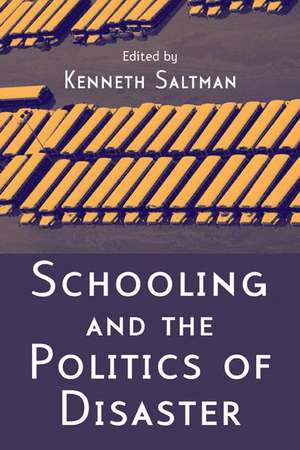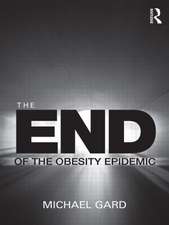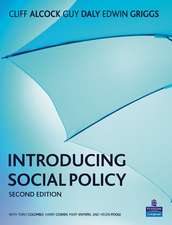Schooling and the Politics of Disaster
Editat de Kenneth J. Saltmanen Limba Engleză Paperback – 24 mai 2007
| Toate formatele și edițiile | Preț | Express |
|---|---|---|
| Paperback (1) | 447.05 lei 43-57 zile | |
| Taylor & Francis – 24 mai 2007 | 447.05 lei 43-57 zile | |
| Hardback (1) | 991.70 lei 43-57 zile | |
| Taylor & Francis – 30 mai 2007 | 991.70 lei 43-57 zile |
Preț: 447.05 lei
Nou
Puncte Express: 671
Preț estimativ în valută:
85.54€ • 89.55$ • 70.78£
85.54€ • 89.55$ • 70.78£
Carte tipărită la comandă
Livrare economică 07-21 aprilie
Preluare comenzi: 021 569.72.76
Specificații
ISBN-13: 9780415956604
ISBN-10: 0415956609
Pagini: 304
Dimensiuni: 152 x 229 x 16 mm
Greutate: 0.56 kg
Ediția:1
Editura: Taylor & Francis
Colecția Routledge
Locul publicării:Oxford, United Kingdom
ISBN-10: 0415956609
Pagini: 304
Dimensiuni: 152 x 229 x 16 mm
Greutate: 0.56 kg
Ediția:1
Editura: Taylor & Francis
Colecția Routledge
Locul publicării:Oxford, United Kingdom
Public țintă
PostgraduateCuprins
Introduction: Schooling and the Politics of Disaster Kenneth J. Saltman Section 1: Theorizing the Politics of Disaster 1. Reading the Signs: A Philosophical Look at Disaster 2. Hurricane Katrina and the Politics of Disposability: Floating Bodies and Expendable Populations 3. Katrina and the Banshee’s Wail: The Racialization of Class Exploitation 4. Feasting on Disaster: Urban Schooling, Globalization, and the Politics of Disaster Section 2: Disaster and Educational Policy 5. Benign Neglect? Drowning Yellow Buses, Racism, and Disinvestment in the City That Bush Forgot 6. The Quiet Disaster of No Child Left Behind: Standardization and Deracialization Breed Inequality 7. No Corporation Left Behind 8. The Schools Are Failing: Think Tanks, Institutes, Foundations and Educational Disaster 9. Disaster Politics and the Right Wing Assault on Public Schooling and Public Space, A Dialogue Between 10. The Patriotic Prejudice: 9-11 on Campus Section 3: Disaster and Global Implications 11. Beyond Cheap French Fries:Remembering The Social In Social Disaster 12. The Independent Women's Forum: Teaching Women’s Rights in "The New Iraq" 13. U.S. Education In A Post-9/11 World: The Deeper Implications of the Current Systemic Collapse of the Neoliberal Regime 14. The Politicisation of Development Aid to Education After September 11 15. The Potential Disaster of Education for Sustainable Development
Recenzii
"I wanted to discuss the book with my colleagues, professors, and classmates. This desire is the mark of a successful book―engaging, thought provoking, and forthright enough in its message to engender discussion."--Lenay Dunn, Education Review (January 2010)
Descriere
Schooling and the Politics of Disaster is the first volume to address how disaster is being used for a radical social and economic reengineering of education. From the natural disasters of the Asian tsunami and the hurricanes in the Gulf Coast, to the human-made disasters in Iraq, Afghanistan, Haiti, Sudan, Indonesia, the United States and around the globe, disaster is increasingly shaping policy and politics. This groundbreaking collection explores how education policy is being reshaped by disaster politics. Noted scholars in education and sociology tackle issues as far-ranging as No Child Left Behind, the War on Terror, Hurricane Katrina, the making of educational funding crises in the US, and the Iraq War to bring to light a disturbing new phenonmemon in educational policy.














